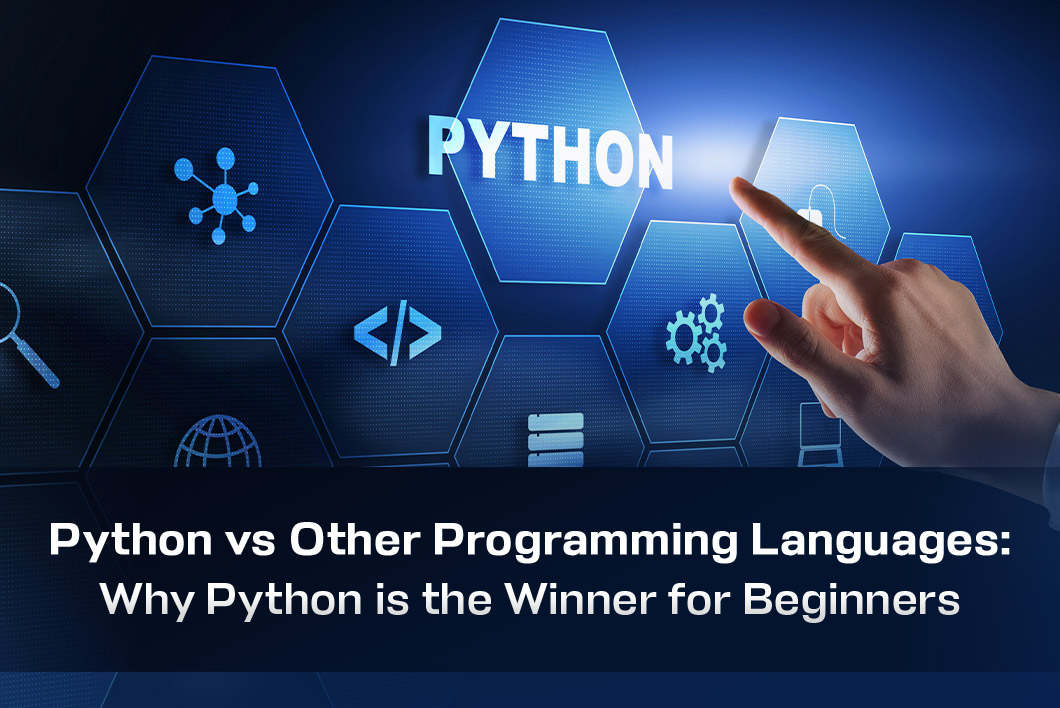
Python vs. Other Programming Languages: Why Python is the Winner for Beginners
Python has become one of the most popular programming languages in the world, especially among beginners. It’s often recommended as the first language for those new to coding, and there’s good reason for that. But how does Python compare to other well-established programming languages like Java, C++, and JavaScript? In this post, we’ll explore why Python is often the best choice for those just starting out, while also comparing it with these other languages.
If you are looking for structured learning, the Best Python Training Institute in Kochi, Kerala can help you start your coding journey with expert guidance and practical projects.
1. Simplicity and Readability: Python's Syntax is a Breeze
One of Python's biggest advantages is its clean and readable syntax. As a beginner, learning a language that allows you to focus on logic without getting bogged down by complicated syntax rules is crucial. Python's syntax closely mirrors human language, which makes it easier for newcomers to understand and write code.
For example, here’s a simple Python program to print “Hello, World!”:
print("Hello, World!")
In contrast, let’s look at how other languages handle this:
Java:
public class HelloWorld {
public static void main(String[] args) {
System.out.println("Hello, World!");
}
}
C++:
console.log("Hello, World!");
While JavaScript is also relatively straightforward, Java and C++ are more verbose. C++ requires the inclusion of libraries and a return type, while Java requires more structure and a class definition. Python, on the other hand, lets you focus on the logic of the program without needing boilerplate code.
2. Cross-Platform Compatibility
Another compelling reason to choose Python is its cross-platform compatibility. Python runs on virtually every major operating system, including Windows, Linux, and macOS, without requiring any modifications. This makes it easier for developers to write code that will work across different platforms, which is not always the case with other languages.
● Java is also cross-platform, thanks to the Java Virtual Machine (JVM). However, it requires more setup to get up and running.
● C++ is platform-dependent, and compiling code on different platforms often requires specific tweaks.
● JavaScript is mainly used for web development, but modern frameworks (like Node.js) have made it possible to use JavaScript for backend development as well.
Python's "write once, run anywhere" philosophy makes it especially attractive for beginners who don’t want to worry about platform-specific configurations.
3. Enormous Community Support and Resources
When you're starting out, one of the most important factors to look for is community support. Python has one of the largest and most active communities in the programming world, which means tons of resources are available to help you learn. Whether you’re looking for tutorials, libraries, or answers to your questions, Python’s community is incredibly welcoming.
● Java also has a large community, but due to its complexity, many beginners might find the Java ecosystem overwhelming. Java’s community is often more focused on enterprise-level development.
● C++ has a huge community as well, but the complexity of the language means the learning curve is steeper. There’s a lot to learn, and the documentation is often geared towards advanced programmers.
● JavaScript has an expansive community, especially in web development, but it can be tricky to navigate because JavaScript has so many frameworks and tools that are constantly evolving.
Python’s community focuses on simplicity and inclusivity, which is why it’s so beginner-friendly.
4. Versatility and Use Cases
Python’s versatility is another reason it’s the best language for beginners. Whether you want to get into web development, data science, automation, or machine learning, Python offers a vast ecosystem of libraries and frameworks to help you get started.
● Java is great for enterprise-level applications, Android app development, and large-scale systems, but it’s less versatile when compared to Python.
● C++ is mainly used for system-level programming, game development, and performance-critical applications. However, C++ isn’t as beginner-friendly, and its syntax can be challenging for new programmers.
● JavaScript is the language of the web. It’s essential for front-end development, and with frameworks like Node.js, it can be used for back-end development too. However, JavaScript isn’t as versatile as Python in fields like data science or AI.
Python shines in diverse fields, including:
● Data Science and Machine Learning: Libraries like Pandas, NumPy, TensorFlow, and Scikit-learn make Python the go-to language for data manipulation, analysis, and building AI models.
● Web Development: Frameworks like Django and Flask make building web applications quick and easy.
● Automation and Scripting: Python is widely used for automating repetitive tasks and writing small scripts for personal projects or work-related tasks.
● Game Development: With libraries like Pygame, Python also has a place in the game development world.
Python offers a wealth of learning paths, making it a great language for those who aren’t yet sure which area of programming they want to specialize in.
5. Large Ecosystem of Libraries and Frameworks
Python’s vast ecosystem of libraries and frameworks is one of the key reasons it’s so beginner-friendly. Whether you need to work with data, build websites, or create machine learning models, Python has a rich set of tools that can help you get started without reinventing the wheel.
● Java has many libraries for backend development (like Spring), but it’s not as beginner-friendly as Python's extensive library ecosystem.
● C++ has libraries for performance and systems programming, but it requires more manual setup and is harder to manage for beginners.
● JavaScript has extensive libraries for web development (React, Angular, Vue), but for other fields like data science, it’s less commonly used compared to Python.
Python’s ecosystem makes it easy to get started with just a few lines of code, helping you learn faster and more efficiently.
6. Focus on Problem-Solving, Not Syntax
Finally, Python lets you focus on problem-solving rather than wrestling with the syntax. Many other languages, especially C++ and Java, require a more rigorous understanding of programming concepts and syntax rules. Python, on the other hand, lets you express solutions in a way that is almost intuitive, which helps beginners focus on learning how to think like a programmer, rather than getting stuck on the technicalities of syntax.
Conclusion: Python is the Winner for Beginners
While every programming language has its strengths and is suited for different purposes, Python’s simplicity, readability, and vast ecosystem make it the ideal choice for beginners. Its versatility allows new developers to explore everything from web development to data science, while its large community ensures you’ll always have support along the way.
Whether you're just starting your programming journey or looking to dive into a new domain like machine learning or web development, Python offers a smooth, accessible path that will set you up for success in the programming world.






 How can I help you?
How can I help you?